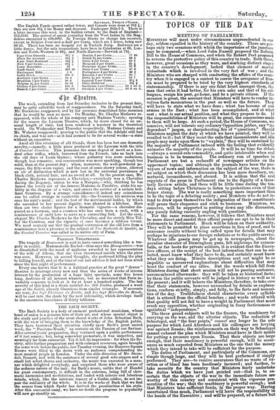Chtertg.
The week, extending from last Saturday inclusive to the present date, may be aptly called the week of reappearances. On the Saturday itself, Mr. Buckstone reappeared, and by his presence demolished false surmises that he would be seen no more. On Monday, Mr. Charles Mathews re- appeared, with the whole of his company save Madame Vestris; opening for the season the Lyceum Theatre, which, by doors closed for an un- usual length of time, had been rendered a mystery in the theatrical world. On Wednesday and Thursday respectively, Madame Celeste and Mr. Webster reappeared ; proving to the public that the Adelphi still had its chiefs, and was not—as it had seemed to be for several weeks—a state without an executive.
Amid all this returning of old friends, there has been but one dramatic novelty,—namely, a little piece produced at the Lyceum with the title A Comical Countess. This possesses the same degree of merit as a hun- dred other trifles, which, borrowed from the French, take us back into the old days of Louis Quinze; whose gallantry was more audacious, though less romantic, and conversation was more sparkling, though less solid, than at the present day ; when, moreover, the well-powdered pe- rique, the fitly-worn rapier, and the coat of some showy colour, allowed an air of distinction which is now lost in the universal prevalence of black cloth, natural hair, and no sword at all. In the present case, Mr. Charles Mathews represents a Chevalier,—everybody was a Chevalier during the Regency, unless he was a Marquis,—who, thinking he has boxed the lovely ear of the famous Madame de Parabere, sinks his no- bility in the disguise of a valet, and enters the service of a certain bril- liant Countess. By a strange coincidence—if indeed any coincidence can be called strange in vaudeville life—the Countess his mistress was once his aunt's maid ; and the foot of the matrimonial ladder, by which she ascended to her present dignity, was planted in a kitchen. Here then are two choice figures for a dramatic vignette—a chevalier dis- guised as a footman, and a countess who has once been a cook, with a reminiscence of early love to serve as a connecting link. Let the easy, elegant Mr. Charles Mathews be the Chevalier, and the stately Miss Tal- bot the Countess, and the vignette at once becomes a tableau vivant. We need scarcely say that the gradual conversion of the old love from a reminiscence into a presence is the subject of Une Soubrette de Quetta, 811 the Comical Countess was called in its native city of Paris.


































 Previous page
Previous page